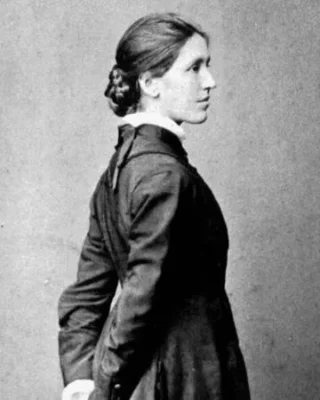
Catherine Leigh Joynes (1857–1919) was born on 8 February 1857 at Eton, Buckingham, the fourth child of the Rev. James Leigh Joynes and Elizabeth Johanne Unger. On the 22 December 1879 she married Henry Salt at the Church of St John Evangelists, Eton. Friends knew her as Kate. Like Henry, and her brothers James Leigh and Herman, she had strong humanitarian beliefs and was active in the Socialist and Labour movement.
Kate Salt
In his My Days and Dreams Edward Carpenter described Kate Salt as “… tall and long-limbed: dark, raven-haired, with large eyes and sensitive, somewhat sad, Dante-like profile… She was intensely emotional, too emotional, but — as such people often are — highly musical; and her literary gift was certainly one of the most remarkable I have known — though unfortunately, except in her letters, rarely utilized.”
Following Kate’s death Sydney Olivier wrote to Henry Salt stating “… Kate has always seemed to me one of the most extraordinary things I have come across or known in my life, so considerably and astonishingly gifted a personality, so dominantly conspicuous an outcrop of the spiritual world, and yet so little known to, or apparently affecting the world, beyond—so far as I know—more than perhaps a score of persons now living… Her literary talent was dazzling.” The letter is published in Sydney Olivier: Letters and Selected Writings, p. 147-8.
Biographical information on Kate Salt remains scant, but see George Hendrick’s Henry Salt Humanitarian Reformer and Man of Letters and Ruth Brandon’s The New Women and the Old Men: Love, Sex and the Woman Question (New York: Norton, 1990), pp. 243–48. Sheila Rowbotham’s Edward Carpenter: A Life of Liberty and Love (London: Verso, 2008), also contains numerous references to Kate Salt throughout, as does Wendy Parkins Edward Carpenter’s Queer Ecology of the Everyday.
Kate died on 16th February 1919, at La Casa, Ozone Terrace, Lyme Regis, Dorset.
To C. L. S.
I send thee, love, this upland flower I found,
While wandering lonely with o’erclouded heart,
Hid in a grey recess of rocky ground
Among the misty mountains far apart;
And there I heard the wild wind’s luring sound,
Which whoso trusts, is healed of earthborn care,
And watched the lofty ridges loom around,
Yet yearned in vain their secret faith to share.
When lo! the sudden sunlight, sparkling keen,
Poured full upon the vales the glorious day,
And bared the abiding mountain-tops serene,
And swept the shifting vapour-wreaths away:—
Then with the hills’ true heart my heart beat true,
Heavens opened, cloud-thoughts vanished, and I knew.
Henry Salt, 1879.
Published: On Cambrian and Cumbrian Hills, 1922